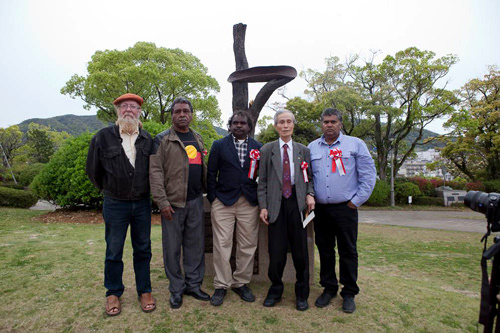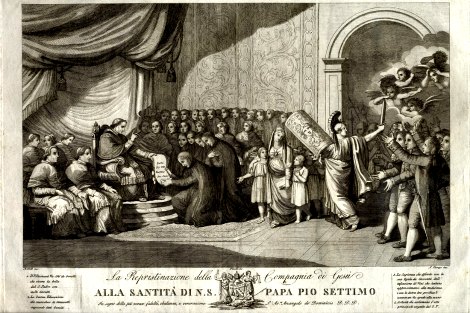Keywords: Feast Of St Ignatius
-

RELIGION
- Andrew Hamilton
- 30 July 2024
5 Comments
In an age marked by increasing tribalism, Ignatius Loyola offers a counterintuitive lens through which to examine the nature of human connection. Renowned as a strict disciplinarian, Loyola is often cast as a distant, austere figure. Yet, beneath his armor of religious rigor lies a nuanced and rich understanding of friendship.
READ MORE
-

AUSTRALIA
- Andrew Hamilton
- 03 August 2023
5 Comments
As our teams struggle for victory on the playing field, is there a deeper meaning to winning that transcends mere conquest? Could our obsession with triumph be being challenged by a more nuanced understanding of success, encompassing not just the game, but politics, relationships, and the very essence of human connection?
READ MORE
-

FAITH DOING JUSTICE
But it is possible the members of the Plenary could begin to hear a deeper voice speaking in their hearts. There may arise a new courage to start a process of truth and reconciliation, reporting the process of this journey to the second Plenary Council planned for Sydney, July 2022. We can only begin that journey if members of the Plenary Council come and are open to listening to that deep inner voice.
READ MORE
-

RELIGION
- Andrew Hamilton
- 30 July 2020
7 Comments
Ordinarily the last two days of July would for me be occasions of celebration. July 30 is the International Day of Friendship and July 31 is the feast day of Ignatius Loyola, the founder of the Jesuits. This July, in Victoria, at least, it is hard to summon energy to celebrate. We are in a time of endurance.
READ MORE 
-

FAITH DOING JUSTICE
- James O'Brien
- 31 October 2019
6 Comments
The rise of the vegan movement challenges us to reflect ethically on food. Writing in the 16th century, Ignatius Loyola prompted his readers to practise reverence in the moment and gratitude for the gifts received when eating. For an age of food and drink on demand, heeding his prompts could help us to balance our inner and outer lives.
READ MORE 
-

RELIGION
- Frank Brennan
- 06 August 2018
How are we to honour the commitment to peace of these Japanese and Maralinga survivors of nuclear conflagrations unleashed maliciously or negligently last century? We need to renew our commitment to painstaking negotiation of international treaties and agreements designed to ensure peace and security for all, insisting on the dignity and human rights of all.
READ MORE
-

RELIGION
- Frank Brennan
- 01 August 2016
Inspired by the person Ignatius, inspired by the person Jesus, we are motivated to make a difference; we are passionate to seek justice for all, especially the poor and the marginalised; we are convinced that we can find God in all things, even in the Don Dale Detention Centre; we know that all persons are called to a deep interior freedom, even those prison guards with hardened hearts; we are convinced that the law of the Lord teaches us right from wrong and that the ways of the Lord inspire us to do and proclaim what is right and to denounce what is wrong, especially when the wrong is done by the powerful upon the powerless.
READ MORE
-

- Frank Brennan
- 26 August 2015
7 Comments
When addressing Italian doctors last November, Pope Francis quoted St. Camillus de Lellis who suggested that the most effective method in caring for the sick was simply to 'Put more heart into those hands.' Let's do something to change the market settings and political settings here in Australia to modify the behaviour of all Australians in the future, and let's attend to our own Franciscan interior ecological conversion with our care for the vulnerable.
READ MORE
-

- Frank Brennan
- 06 August 2015
3 Comments
Pope Francis is not the first pope to address a social encyclical to everyone. But in comparison with his predecessors, Francis has been more inclusive in the process of writing the encyclical and in the final content of the document. He quotes from 17 different conferences of Catholic bishops. He is at pains to indicate that he is collaborative and that he takes the principle of subsidiarity very seriously. Being the final redactor of the text, he has felt free to interpolate some very folksy advice from time to time. He has also taken the liberty of inserting some very blunt, evocative images of environmental and economic devastation.
READ MORE
-

- Frank Brennan
- 03 August 2015
1 Comment
I am one of those Jesuits who sometimes has been perceived as not being sufficiently loyal to the church hierarchy. From time to time, people of good will have urged me to consider Ignatius' rules for thinking with the Church which are appended to his Spiritual Exercises. The stereotypical view of those rules is often summed up by quoting the first sentence of the 13th rule: 'To keep ourselves right in all things, we ought to hold fast to this principle: What I see as white, I would believe to be black if the hierarchical Church would thus determine it.' But life was not ever that simple, even in the time of Ignatius. Feast of St Ignatius homily by Frank Brennan
READ MORE
-

- Andrew Hamilton
- 30 July 2015
3 Comments
Ignatius of Loyola, whose feast day is on 31 July, is remembered for founding the Jesuits, for his Spiritual Exercises and for the effect Jesuits had on European history and in overseas missions. He was a man who made a difference. But during his life that reputation was not a done deal. One often overlooked event, more accurately an event that failed to happen, shaped decisively how he has come to be remembered.
READ MORE
-

AUSTRALIA
- Frank Brennan
- 07 August 2014
31 Comments
Everyone knows the Jesuits have had a rocky history. They were fabulously successful in educating the European elite for quite some time. But things went off the rails badly in the eighteenth century, and in 1773 Pope Clement XIV issued a decree to 'abolish and suppress the oft-mentioned Society'. Eventually his successor Pope Pius VII issued a papal bull restoring the Society, two hundred years ago this week.
READ MORE 